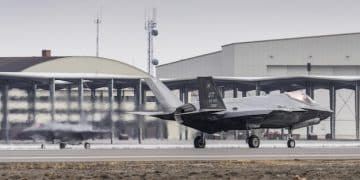Defense Industry Lobbying 2025: Key Issues Policymakers Target

Defense industry lobbying in 2025 primarily focuses on securing funding for advanced technologies like AI and hypersonic weapons, advocating for sustained modernization programs, enhancing supply chain resilience, and influencing policy around international defense partnerships to ensure competitive advantage and national security.
As 2025 approaches, understanding the focal points of Defense Industry Lobbying: Which Issues are Receiving the Most Attention from Policymakers in 2025? becomes crucial. The defense sector, inherently intertwined with national security and geopolitical dynamics, continuously engages with policymakers to shape legislation, secure funding, and influence strategic priorities. This ongoing dialogue ensures that defense capabilities align with evolving threats and technological advancements, presenting a complex interplay of industrial innovation, political will, and global stability.
The Evolving Landscape of Defense Policy and Influence
The defense industry’s relationship with policymakers is a dynamic and essential component of national security. As global geopolitical landscapes shift, so do the priorities and investments within the defense sector. In 2025, several critical issues are at the forefront of discussions between defense contractors, their lobbyists, and government officials. These conversations are not merely about securing contracts; they are fundamentally about shaping the nation’s defense posture, economic stability, and technological superiority.
The intricate dance between innovative technology, economic imperatives, and geopolitical realities forms the bedrock of these policy discussions. Understanding this interplay is key to deciphering where industry influence is most heavily concentrated and why specific issues gain traction over others. The industry’s ability to articulate its needs and demonstrate its value directly impacts the allocation of resources and the direction of future defense initiatives. The emphasis is increasingly on proactive engagement, anticipating future threats and developing solutions before they become immediate crises.
Budgetary Allocations and Program Funding
One of the most persistent and paramount concerns for the defense industry is the annual budgetary allocation. Lobbyists consistently advocate for stable and increased defense spending to sustain existing programs, fund new initiatives, and invest in research and development. The unpredictability of budget cycles can create significant challenges for long-term planning and investment, making consistent access to capital a core lobbying objective. This stability is not just about profit margins; it’s about maintaining a skilled workforce, supply chain integrity, and the ability to innovate.
- Predictable Spending: Advocating for multi-year funding authorizations to enable better planning and reduce development costs.
- Specific Program Support: Lobbying for critical funding for high-priority projects like next-generation fighter jets, naval vessels, and missile defense systems.
- Research & Development (R&D) Increases: Pushing for greater investment in foundational research to maintain a technological edge against adversaries.
Beyond the headline numbers, the details of how funds are distributed across various departments and programs are meticulously sculpted through lobbying efforts. This includes advocating for specific contract vehicles, ensuring a competitive bidding environment while also highlighting the unique capabilities of individual companies. The aim is to ensure that taxpayer money is utilized efficiently to deliver the most effective defense capabilities.
Technological Superiority and Modernization Efforts
In an era of rapid technological advancement, maintaining a qualitative military edge is paramount. The defense industry is continuously pushing for policies that support the development and integration of cutting-edge technologies. This extends beyond traditional hardware to include advancements in artificial intelligence, cybersecurity, quantum computing, and space capabilities. These areas represent the future of warfare and are critical for deterrence and defense.
The drive for technological superiority is a key driver for lobbying activities. Companies invest heavily in R&D and then work to convince policymakers of the necessity and transformative potential of their innovations. This often involves demonstrating how new technologies can reduce risks, enhance operational efficiency, and ultimately save lives. The focus is on ensuring that the U.S. military remains at the forefront of global defense capabilities, adapting to new threats more rapidly than its adversaries.
Artificial Intelligence (AI) and Machine Learning (ML) Integration
The integration of AI and ML across various defense applications is a top priority. Lobbyists are focusing on securing funding for AI-driven logistics, autonomous systems, predictive maintenance, and advanced intelligence analysis. The goal is to enhance decision-making processes, reduce human workload in dangerous environments, and improve the accuracy of military operations. This involves not only developing the technology but also establishing ethical guidelines and robust testing protocols.
The ethical implications of AI in warfare are a significant discussion point, and the industry is keen to help shape policies that balance innovation with responsible use. They advocate for frameworks that allow for rapid development while addressing concerns about autonomy and accountability. This dual focus on technological advancement and ethical governance is crucial for public and political acceptance.
Hypersonic Weapons Development
The global race for hypersonic capabilities has made its development a critical focus. Lobbying efforts aim to accelerate research, testing, and production of hypersonic missiles and defense systems. This push is driven by the need to counter advanced threats from peer competitors and to ensure the U.S. has a credible deterrent in this rapidly evolving domain. Securing dedicated funding streams and expedited development pathways is a key objective.

- Accelerated R&D: Advocating for increased federal investment to speed up the development cycle of hypersonic technologies.
- Testing Infrastructure: Pushing for funding to expand and modernize test facilities required for hypersonic flight and weapon systems.
- Supply Chain Resilience: Ensuring that the industrial base can support the production demands of these complex systems.
The development of hypersonic technologies requires a long-term commitment and significant investment. Lobbyists highlight the strategic imperative of leading in this area, emphasizing that gaining a decisive edge here is crucial for national security in the coming decades. They also underscore the importance of international collaboration where appropriate, pooling resources and expertise to advance shared defense interests.
Supply Chain Resilience and Domestic Production
Recent global disruptions have underscored the vulnerabilities in complex supply chains. The defense industry is acutely aware of its reliance on a robust and secure domestic industrial base. As a result, a significant portion of lobbying efforts in 2025 will center on bolstering supply chain resilience, promoting domestic production, and reducing dependence on foreign sources for critical components and materials.
This focus is not solely about economic protectionism; it’s a national security imperative. Ensuring that the U.S. military has uninterrupted access to essential parts and finished goods, even during times of crisis, is crucial. Lobbyists advocate for policies that incentivize domestic manufacturing, support small and medium-sized businesses in the defense sector, and streamline regulatory processes to accelerate production.
Critical Material Sourcing
Lobbyists are pushing for policies that diversify sourcing of critical minerals and materials, particularly those integral to advanced defense technologies. This includes advocating for investments in domestic mining, processing capabilities, and recycling initiatives. Reducing reliance on potential adversaries for vital resources is a strategic priority that directly impacts the readiness and technological edge of the U.S. military. This involves not only identifying alternative sources but also developing new methods for material production.
The discussions around critical material sourcing often involve delicate diplomatic negotiations as well, seeking to secure reliable supply agreements with allied nations. The industry’s role is to ensure that policymakers understand the direct link between supply chain security and national defense capabilities, advocating for robust legislative and investment frameworks.
Cybersecurity of the Defense Industrial Base (DIB)
Strengthening the cybersecurity posture of the entire Defense Industrial Base (DIB) is another top lobbying issue. With increasing cyber threats from state-sponsored actors and sophisticated criminal enterprises, ensuring the integrity and security of defense contractors’ networks is paramount. Lobbyists advocate for increased funding for cybersecurity initiatives, stricter compliance standards, and collaborative threat intelligence sharing between government and industry.
This includes advocating for resources to help smaller defense contractors meet evolving cybersecurity requirements, recognizing that vulnerabilities anywhere in the supply chain can compromise the entire system. The goal is to create a resilient and secure digital ecosystem that can withstand persistent and evolving cyberattacks, protecting sensitive data and intellectual property.
International Partnerships and Export Controls
The intricate web of international defense partnerships plays a crucial role in global security and the economic health of the defense industry. Lobbying efforts often focus on facilitating military aid packages, promoting foreign military sales (FMS), and streamlining export control regulations with allied nations. These partnerships bolster U.S. influence abroad, create interoperability with allies, and provide economies of scale for defense production.
The discussions around international cooperation are multi-faceted, balancing national security interests with economic benefits. Lobbyists advocate for policies that enable the U.S. defense industry to remain competitive in the global market while ensuring that sensitive technologies do not fall into the wrong hands. This involves navigating complex geopolitical considerations and understanding the unique needs of different allied nations.
Foreign Military Sales (FMS) Streamlining
Lobbyists are advocating for reforms to streamline the Foreign Military Sales (FMS) process, making it more efficient and responsive to the needs of U.S. allies. Delays in FMS can impact the ability of allies to acquire necessary defense equipment, potentially forcing them to look to other suppliers. Accelerating these processes benefits both U.S. defense companies and strengthens alliances, ensuring interoperability and shared strategic goals.
- Reduced Bureaucracy: Pushing for legislative changes to simplify the approval process for defense exports.
- Capacity Building: Advocating for programs that help allies develop their own defense capabilities, often through U.S.-supplied equipment and training.
- Competitive Edge: Highlighting the importance of timely delivery to compete with other global defense suppliers.
The efficiency of FMS directly impacts the global standing of the U.S. defense industry. By making the process smoother, the industry can better serve its international customers, reinforcing strategic partnerships and contributing to global stability. These efforts often involve close coordination with the Department of Defense and the State Department.
Enhanced Intelligence Sharing and Joint Exercises
Beyond sales, lobbyists also emphasize the importance of enhanced intelligence sharing and joint military exercises with key allies. These activities foster interoperability, build trust, and improve collective defense capabilities. Advocating for sustained funding and prioritization of these programs ensures that the U.S. military and its allies can operate seamlessly in complex environments against shared threats. This collaborative approach enhances overall security.
The industry’s role here is often to highlight how their technologies can facilitate these joint efforts, whether through secure communication systems, compatible platforms, or advanced training simulations. They serve as a bridge between the technological capabilities and the strategic imperatives of international cooperation, emphasizing mutual benefits and shared responsibilities.
Workforce Development and Industrial Base Health
A strong defense industry relies on a highly skilled workforce and a robust industrial base. Another significant area of lobbying attention in 2025 revolves around policies that support workforce development, STEM education, and maintaining the health of the defense industrial ecosystem. This includes advocating for training programs, apprenticeships, and incentives to attract and retain talent in critical defense-related fields.
The aging workforce in some defense sectors and the intense competition for STEM graduates necessitate proactive policy interventions. Lobbyists seek to ensure that the U.S. has a continuous pipeline of engineers, scientists, technicians, and skilled tradespeople capable of designing, building, and maintaining advanced defense systems. This is a long-term investment in national security that transcends immediate procurement cycles.
STEM Education and Apprenticeship Programs
Lobbyists advocate for increased federal investment in STEM education from K-12 through higher education, emphasizing the critical role these disciplines play in national defense. They also push for the expansion and funding of apprenticeship programs within the defense industry, providing practical, hands-on training for future workers. These programs are vital for transferring specialized knowledge and skills to the next generation of the workforce, ensuring the continuity of expertise.
Such initiatives often involve partnerships between industry, academia, and government, creating a holistic approach to talent development. The defense industry emphasizes that a strong pipeline of skilled workers is as crucial as technological innovation, forming the bedrock of national defense capabilities. They work to highlight the long-term benefits of these investments, not just for the industry but for national competitiveness.
Small Business Support and Innovation Incentives
Supporting small and medium-sized businesses within the Defense Industrial Base is a key lobbying focus. These businesses often serve as vital suppliers and innovators, but they may lack the resources of larger prime contractors. Lobbyists advocate for programs that provide financial assistance, simplify procurement processes, and offer incentives for small businesses to participate in defense contracts and bring their innovative solutions to market.
This includes advocating for policies that foster innovation and entrepreneurship within the defense sector, recognizing that ground-breaking ideas can come from any size of company. The goal is to maintain a diverse and competitive industrial base that can rapidly adapt to evolving defense needs. Ensuring a level playing field for these smaller entities is seen as essential for long-term health and agility of the industry.
Environmental, Social, and Governance (ESG) Considerations
While often seen as separate from traditional defense concerns, ESG principles are increasingly influencing defense industry lobbying. Companies are recognizing the importance of demonstrating responsible corporate citizenship, particularly as younger generations enter the workforce and investors prioritize sustainable practices. This translates into lobbying efforts around sustainable manufacturing, responsible resource management, and ethical business practices within the defense sector.
The industry is working to address concerns about its environmental footprint, social impact, and governance structures. This involves advocating for policies that incentivize green technologies in defense production, promote diversity and inclusion within the workforce, and ensure robust ethical oversight. Demonstrating a commitment to ESG principles can enhance public perception, attract talent, and secure investor confidence.
Sustainable Practices in Defense Manufacturing
Lobbyists are engaging with policymakers to promote and fund initiatives for more sustainable defense manufacturing processes. This includes advocating for investments in renewable energy at defense facilities, reducing waste and emissions, and developing cleaner production techniques. The aim is to align defense operations with broader environmental goals, demonstrating leadership in sustainable industrial practices. This often involves discussions about lifecycle assessments of defense products.
These efforts are not just about compliance; they are about long-term operational efficiency and resource conservation. The industry seeks to show that national security and environmental stewardship are not mutually exclusive but can indeed be complementary objectives, leading to more resilient and efficient defense operations.
Ethical AI and Autonomous Systems Development
The development of ethical guidelines for AI and autonomous systems is a critical ESG concern. Lobbying efforts in this area focus on ensuring that policies allow for innovation while embedding strong ethical frameworks and accountability mechanisms. This includes advocating for transparent development processes, human oversight where necessary, and robust testing to prevent unintended consequences. The industry seeks to be a proactive partner in shaping these crucial regulations.

The reputation of the defense industry is increasingly tied to its commitment to ethical AI. By actively participating in the policy dialogue, companies aim to build public trust and demonstrate their dedication to responsible technological advancement. This involves not only technical expertise but also a deep understanding of societal values and concerns regarding AI in defense applications.
| Key Issue | Brief Description |
|---|---|
| 🛡️ Budget & Funding | Securing stable defense spending and predictable program funding. |
| 🚀 Tech Superiority | Accelerating AI, ML, and hypersonic weapons development. |
| 🔗 Supply Chain Resilience | Promoting domestic production and strengthening DIB cybersecurity. |
| 🤝 Global Partnerships | Streamlining FMS and enhancing intelligence sharing with allies. |
Frequently Asked Questions About Defense Industry Lobbying in 2025
The primary goal is to ensure robust and consistent funding for defense programs, promote the adoption of advanced technologies like AI and hypersonics, enhance supply chain security, and foster international defense partnerships. These efforts collectively aim to maintain the U.S. military’s technological edge and ensure national security readiness amidst evolving global threats. Lobbyists also work to shape favorable regulatory environments.
Technological advancement profoundly shapes lobbying priorities by shifting focus towards emerging capabilities. In 2025, this means a strong emphasis on securing funding and policy support for cutting-edge areas such as artificial intelligence, machine learning, quantum computing, and hypersonic weapon systems. Lobbyists aim to ensure that military modernization programs prioritize the integration of these transformative technologies.
Supply chain resilience is a critical concern due to recent global disruptions highlighting vulnerabilities. The defense industry relies on a secure domestic industrial base to produce essential components and materials. Lobbyists advocate for policies promoting domestic manufacturing, diversifying critical material sourcing, and bolstering cybersecurity across the Defense Industrial Base (DIB) to ensure uninterrupted access to vital supplies.
International partnerships are vital for global security and industry growth. Lobbyists advocate for streamlining Foreign Military Sales (FMS) processes, facilitating military aid, and enhancing intelligence sharing with allies. These efforts bolster U.S. influence, promote interoperability among allied forces, and provide economies of scale for defense production, ensuring the U.S. remains a preferred security partner worldwide.
Environmental, Social, and Governance (ESG) considerations are increasingly influencing defense lobbying by promoting responsible corporate practices. This includes advocating for sustainable manufacturing processes, ethical development of AI and autonomous systems, and fostering diversity within the workforce. The industry seeks to demonstrate its commitment to corporate responsibility, enhancing public perception and attracting investment while balancing national security needs.
Conclusion
The landscape of defense industry lobbying in 2025 is clearly defined by a proactive pursuit of technological superiority, unwavering advocacy for stable funding, and a strong emphasis on global strategic partnerships. Key policymakers are poised to give significant attention to issues surrounding artificial intelligence, hypersonic weapon development, and the critical importance of a resilient domestic supply chain. Furthermore, the industry’s commitment to ESG principles and workforce development reflects a broader understanding of its role in national security and societal well-being. This complex interplay of innovation, policy, and global dynamics will continue to shape the U.S. defense posture for years to come.





